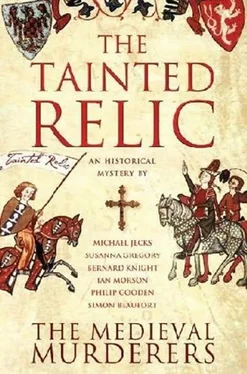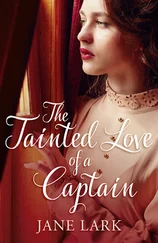‘Leaving aside William, we have at least three people who might have done this murder,’ said Jack. ‘Two of them possibly because they wished to get their hands on the relic, that’s Tom Gally and Peter Perkin. And then we have this Wapping Doll, who is apparently jealous of Hatch’s success with the pig woman. Perhaps she headed back to the tent when the fight was stopped. Her blood was up and she decided to have it out with him.’
I recalled the scene between Wapping Doll and Ulysses Hatch in the tent. There’d been a kind of ribald affection there. They might strike each other, just as she might swap blows with a woman. But to seize a pistol and shoot him…? And why should she take the so-called relic away with her? She was frightened of it. I didn’t think so. I shook my head, and noticed that the others were shaking theirs at the same time.
‘It doesn’t work, Nick,’ said Jack. ‘I know Tom Gally a little better than either of you since I’ve been with the playhouses longer. He’s a nasty piece of work, ready to spread lies and slander and not above a spot of pilfering. But that’s a distance away from being a murderer.’
‘It’s the same with Peter Perkin,’ said Abel. ‘I don’t know him or Ben Nightingale except by reputation. But nips and foists rely on their wits and the speed of their hands. I have kept company with a few of them in the past. They don’t kill people. Why, their proudest boast is to rob you without you noticing it for the next five hours.’
‘I was thinking the same about Wapping Doll,’ I said. ‘She’s not a murderer surely. So…if we exclude them, who does that leave?’
‘It leaves us ,’ said Abel.
‘You mean, it leaves me ,’ I said.
My friends didn’t reply but I realized that this was exactly what they did mean. I had been summoned into the tent by Ulysses Hatch while they had been left outside, only to drift out of earshot after a few minutes. The bookseller and I had been talking for half an hour perhaps. In all probability, I had been the last person to see him alive apart from his murderer. Of course, Jack and Abel couldn’t really think I was guilty of shooting him, could they? If so, why would I have urged them to accompany me on my second visit to Hatch’s tent? Besides, if I’d really killed Hatch I would be halfway across the Surrey Downs by now.
These were gloomy thoughts. We lapsed into silence, slouching against the cell walls or sitting with our backs to them. The dusty rays of sunlight inched up the far wall. For all that there was nothing so alarming about our present predicament, my confidence that this was a simple confusion which would be cleared up after a few words with Justice Farnaby began to dwindle. I’d been in gaol before, under a false accusation. So had Jack Wilson, come to that, since he’d served a few days in one of the Clink prisons following a youthful affray. And I didn’t doubt that Abel was familiar with the inside of a cell or two. Nevertheless, it is not pleasant to be locked up, even for an hour or so. And there’s something incongruous about being confined in the midst of a fair while everyone else is so free and easy. When the noises of it-the shouts and the cries and songs-come distantly to your ears you feel like a child, punished and shut out from some treat.
I may have been quietly fearful but, sitting against the rough-cast wall, I fell into a kind of daydream in which the figure of Tom Gally pursued me, trying to sell copies of a pamphlet called The Wanton Wife complete with salty pictures. Over Gally’s head hovered a raven shrieking ‘Jump to it!’ Then I visualized a youthful William Shakespeare-more hair in those days-whispering compliments into the ear of an equally youthful Wapping Doll, as fine a piece of goods as Ulysses Hatch had claimed. Suddenly I was woken by the sound of the key turning in the cell door. Jack and Abel also jerked to attention.
The beetle-browed constables stood at the door. By gestures rather than words they indicated that we were to follow them. They escorted us down a flagged passage and into a pillared chamber that had probably been the monks’ refectory. At the far end, seated in an oak chair that could have belonged to a prior, was Justice Walter Farnaby, neatly bearded and precise. There were a handful of other individuals standing or sitting near by, including a couple more constables and an elderly clerk positioned behind a table with pen and paper. This was Pie-Powder Court. I don’t know the origins of this strange name but I do know that it’s not empowered to hear serious cases, only instances of trading without licence or cheating or petty theft. Nevertheless, Justice Farnaby had the authority to arraign any man and to cause him to be taken before a more severe court. We lined up before him, flanked by the constables. To judge by the way he was looking at us, if we weren’t quite prisoners we were definitely not free men.
There was a sudden shriek of ‘That’s him!’ from one of the bystanders. This was unnerving. More unnerving still was to discover that it was Wapping Doll. She was pointing at me. Her face was distorted with rage or grief. ‘I saw him with my Yew-lee. I left them alone together. He killed Ulysses Hatch!’
‘Be silent, woman,’ said Justice Farnaby. ‘You don’t know what you’re saying.’
His voice was low but commanding. Wapping Doll gaped but said nothing more. Farnaby requested that we identify ourselves by name and occupation. It was for the record only, since I’d have bet a week’s wages he already knew who we were.
‘Gentlemen,’ said Justice Farnaby to us when this process was complete, ‘a man has been murdered. This is too grave a matter for Pie-Powder Court. I have given orders that Hatch’s tent is to be guarded before the body is removed. Nevertheless, preliminary statements will be taken here and, if the evidence is persuasive, indictments will follow. I have already heard accounts from several of those who recently saw Master Hatch alive, like that lady there. But you were the first to find him dead. Your stories, if you please.’
Jack and Abel turned to me. This public hearing seemed a slightly irregular way of going about evidence-gathering but I supposed that the Bartholomew Fair court was a more provisional affair, one in which matters had to be settled quickly. As briefly as I could, I outlined the circumstances that had brought the three of us to the fair, my commission from WS, the conversation with the bookseller, the arrangement to return when he’d found the item in question, our discovery of Hatch’s body. The elderly clerk took notes of all this, snuffling and clearing his throat in a distracting way.
The only details I omitted were probably the most important ones, to do with the relic. Even though the theft of the fragment provided a motive for murder I didn’t want to complicate matters. As it turned out, not mentioning this was a mistake since Farnaby already knew of it.
‘Master Hatch showed you nothing else?’ he said.
‘I am not sure what you mean, sir,’ I replied.
‘There was no other item of value?’
‘I do not recall so.’
‘Yet you are carrying four pounds in your purse, are you not? As if you came here with the where-withal to purchase something of value.’
‘That was the sum which Master Shakespeare had given me to buy back his foul papers.’
‘The money was not to buy a piece of wood which purported to come from the cross of our Lord and which is no longer to be found anywhere on Master Hatch’s premises?’
There was a gasp from someone in the makeshift court at this. I felt myself grow red like a child.
‘Wood from the cross?’
‘Just so. Did Master Hatch mention such an item?’
Читать дальше












